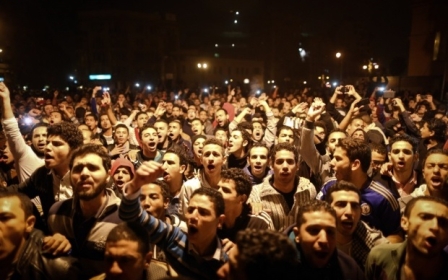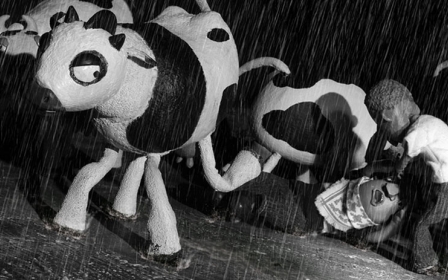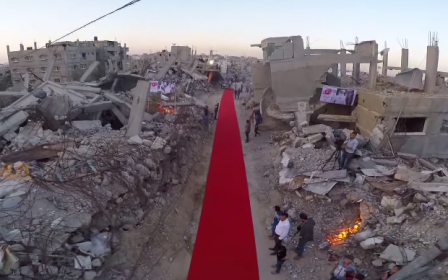FILM REVIEW: '3,000 Nights'

In today’s daily tide of reporting of the Jerusalem uprising, Palestinians are routinely dehumanised and the context of resistance lost. In dramatic contrast, Mai Masri’s new film 3,000 Nights, recently shown at the London film festival, is an unforgettable human portrait of a group of Palestinian women in Israel’s Ramla prison in the 1980s. The London audience, many in tears, stood up at the end to applaud Masri and her producer Sabine Sidawi Hamdan.
Masri’s documentary films have won many international prizes over the years. Among the best known are Children of Fire (1990), Children of Shatilla (1989), Frontiers of Dreams and Fears (2001), mainly focused on Palestinian children’s realities against the background of successive intifadas and dispossession. This is her first feature film, but it is fiction rooted in real experiences of Palestinian women she has been talking to for years on trips to Palestine from her home in Beirut.
“The 1980s was a time when Palestinian women prisoners from PFLP [the Popular Front for the Liberation of Palestine], Fatah etc., fought the authorities for every single thing – even a pencil," Masri said.
"There was leadership, classes, teaching for illiterate women. I wanted Palestinians today – and of course others - to see these lives."
It was a time when hunger strikes and tear-gassing in the prison became a public scandal. Renowned lawyers such as Leah Tsemel spoke out about what was happening to their Palestinian clients.
New MEE newsletter: Jerusalem Dispatch
Sign up to get the latest insights and analysis on Israel-Palestine, alongside Turkey Unpacked and other MEE newsletters
“It was the time of Sabra and Shatilla – it was a turning point, even for many Israelis who went on demonstrations, even the guards were affected," Tsemel said. "And 5,000 prisoners were released, as you see when some of the women in the film leave the prison.”
At that time Ramla had both male and female prison wings, and in the female cells Israeli and Palestinian prisoners were sometimes kept together. Masri uses all these elements as she builds the background of violence the prisoners learn to live through.
Layal, the central character (played by Maisa Abd Elhadi) is a schoolteacher from Nablus, newly married and planning to leave with her husband for Canada. She is arrested after giving a lift to a young man she doesn't know, and is encouraged by her lawyer in court to say that she picked him up because he threatened her, in the hope of being freed. But she won’t say it, and is jailed for eight years.
She is put first in a cell with Israeli female criminals – including drug addicts – where she is bullied. Then when she is put in a cell with Palestinian women she is also initially isolated, and treated with suspicion as a probable informant. Her cell-mates’ backstories are left to the audience's imagination, but their personalities vividly express their political status – the resistance fighter from Lebanon who has lost an arm, the grandmother with two grandsons in the men’s prison, the two inseparable school girls arrested in their classroom.
“Leyal stands apart from the others because she’s not part of the resistance, she’s an ordinary school teacher,” Masri said.
Stories former prisoners told her of giving birth in prison while shackled to the bed haunted Masri’s imagination, and Leyal’s experience is built out of several true accounts. Her husband urges her to have an abortion, and then chooses a new life in Canada without her. In the prison dining room there are brutal fights between the Israeli drug addicts and the Palestinian political women. Jamileh, a schoolgirl prisoner (played by Rakeen Saad), whose smuggled notes are found by the guards, is tortured and returns to the cell visibly battered.
Leyal transcends all this bleakness. She changes in the intimacy of the cell’s communal life, and also by becoming a mother. All the women are changed too by the baby in their lives and he is smothered in loving care. The film has unlikely moments of lyrical happiness for Leyal with her boy Nour – drawing him animals on the cell walls, playing with a wooden bird made for her by Ayman, (played by Karim Saleh), a Palestinian prisoner doctor who has seen her in hospital and fallen in love with her. Saleh gives a performance of delicate tenderness. He is based in Los Angeles and is Lebanese – the only non-Palestinian actor.
All the women in the film – Israelis as well as Palestinians - are played by Palestinians, some who live in Israel, some from the occupied West Bank and others who live as refugees in Jordan or Lebanon. The experience of Israeli jails is part of all their lives – often from childhood glimpses of brothers or fathers in the dehumanising circumstances that mark jail visits under Red Cross auspices still today.
“There was a lot of raw emotion and tears, especially when we entered the old Jordanian prison where we shot,” Masri says.
That abandoned prison with thick, dilapidated walls and rusty bars gave the actors an important psychological framework, she says.
The cast includes well-known professional actors and women who have never acted before. Masri pays tribute to her two casting directors: “They really worked hard, so many visits across the region to find this amazing cast.”
Brief scenes of dozens of brown uniformed prisoners in the men’s courtyard are played by dozens of extras, mainly Syrian and Iraqi refugees. Casting them was a poignant process.
“These were such brilliant, educated people who had lost everything. Who were we to judge them, giving them one or two days’ work?” Masri asked. She reflected that no doubt many of them had had the very prison experiences they were portraying.
“The issue is close to them too … watching them is a reminder that Palestine is not the only tragedy of our region.”
3,000 Nights had its premiere at the Toronto film festival, and was also shown in Bustan, South Korea. It will be released early next year in Europe, the Middle East and the US.
Middle East Eye delivers independent and unrivalled coverage and analysis of the Middle East, North Africa and beyond. To learn more about republishing this content and the associated fees, please fill out this form. More about MEE can be found here.




